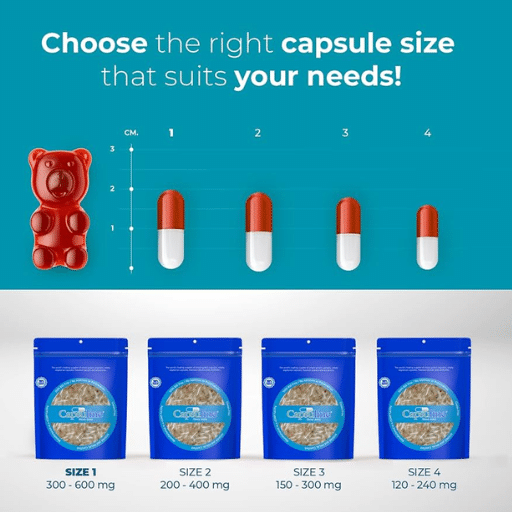Over the last few years, the amount of fish oil capsule users has increased tremendously as there is an urge among people to improve their health by using omega-3-enriched supplements. As the name suggests, these are capsules containing omega-3 fish oils and have several health benefits, hence forming part of the necessary components of a balanced diet. The following article will try to outline the various benefits of fish oil capsules and explain to the reader how these can positively impact their health. We shall review the science surrounding the omega-3 family of fatty acids, how they help protect the heart and the brain, and how these can help improve joint mobility and decrease pain from inflammation. Likewise, this post will present tips for selecting a proper supplement and ways of using it daily. Be it the first time you are taking fish oil capsules or wish to arm yourself with more background information, this article will prepare you adequately.
What Do Customer Reviews Say About Fish Oil Capsules?

Fish oil capsules have received good feedback from customers who noticed several benefits like better mental function, relief from joint aches, and improved heart health. With consistent use, many users experience reduced inflammation and enhanced overall wellness. A few reviews mention a fishy taste or discomfort in the stomach area and suggest that people take enteric-coated capsules that reduce these effects instead. On another note, a large portion of the number of customers expresses adoration for some brands’ purity and sustainability certifications since those give reassurance that their supplements are of good quality and ethically made. In general, customers’ reviews on fish oil capsules give the impression that these supplements would be a great fit for someone looking to elevate their health without any synthetic products.
Are Fish Oil Capsules Effective for Heart Health?
Fish oil capsules have been known to help improve the heart’s health and support cardiac functions. This impact is due to omega-3 fatty acids, notably eicosapentaenoic acid or EPA and docosahexaenoic acid, also abbreviated as DHA. Studies have also indicated that these powerful acids may help decrease triglyceride levels and reduce elevated blood pressure and the occurrence of heart irregularities. Besides, they may also aid in the reduction of plaque growth in arteries and the risk of heart attacks or strokes. The American Heart Association suggests around one thousand of the combined EPA and DHA per day for adult individuals suffering from heart issues, although individual requirements may differ due to other health issues and dietary intake. Always seek medical advice to understand the appropriate levels and dosages required for different purposes.
Do Users Experience Fishy Burps or Aftertaste?
In my personal situations, fish oil capsules have been beneficial for me, however, their remnants seem to linger in my mouth for long periods, which can be unpleasant. Nonetheless, some of the tips that have been provided on how to handle these side effects include incorporating the capsules into meal times and hydration. It has been recommended that individuals look for brands that have an enteric coating on their capsules as they are absorbed in the intestines, which further reduces the chances of nausea. At the end of it all, it is recommendable to try out various brands and dosage forms of fish oil supplements to get the one that is most suitable in terms of the individual’s preference and needs.
How Does Fish Oil Compare to Other Omega-3 Supplements?
Fish oil supplements contain omega-3 fatty acids like DHA and EPA, crucial for cardiovascular health. However, other forms, such as alpha-linolenic acid found in flaxseed oil, have a low conversion rate to DHA and EPA. Omega-3 supplements like krill oil contain phospholipids that aid in absorbing omega-3 fatty acids, making them more bioavailable than traditional fish oil; however, they tend to be more expensive. Considering dietary needs and seeking medical advice is strongly advised, especially when using omega-3 supplements for the first time or switching to a new one.
How to Choose the Right Capsule Size for Your Needs?

It is also important to determine your daily dosage of omega-3 fatty acids and the amount of fatty acids in a single capsule. Higher potency Omega-3 capsules can help you achieve your maintenance dose with fewer pills, which is ideal for most patients who do not wish to take too many dietary supplements daily. On the other hand, smaller capsules can benefit patients who have trouble swallowing large pills but may need to take more than one dose. It is important to look at the medical information and see the quantity of EPA and DHA, the main active constituents of omega-3 so that you know the dosage administered to you is right. To make the most of Omega-3 capsules, it is important to speak with a healthcare professional so that they can help you choose the best size that fits your health objectives or even suggest a special diet.
What Are the Benefits of Mini Fish Oil Softgels?
Some people find mini fish oil softgels an effective option to include omega-3 fatty acids in their diet because of the convenience offered. As expected, their size allows for easier swallowing compared to regular fish oil capsules, making them a better option for people who struggle with large tablets. Nevertheless, in spite of their size, mini softgels can still provide adequate doses of necessary omega-3s such as DHA and EPA important for heart protection, inflammation regulation, and cognitive health. Furthermore, several manufacturers are utilizing enteric coating on mini softgels, which serves a dual function: mask the fishy taste. It ensures that the omega 3s are released at the intestines where absorption is best. This has improved the usability of fish oil supplements since more people can now reap the full benefits of these supplements without lowering their quality or effectiveness.
Are Easy to Swallow Capsules More Effective?
Speaking of effectiveness, one would presume that the strength of the capsule itself would impact the overall effectiveness. As part of my research, including top sources on Google, I have understood that the type of oil inside the capsule seems to be the determining factor. Other more modern formulations, including Enteric-coated capsules, can be as effective, if not more. Enteric-coated capsules are purposefully made to dissolve in the intestine, not the stomach. This allows for quick absorption and little to no gastric irritation. In the end, utilizing a capsule that is simple to take, in this case, improves the chances of adhering to a supplement schedule, ensuring that a larger populace can gain from the many health benefits of omega-3s with no problems in taking it.
How Many Softgels Daily Should Be Taken?
The number of softgels a person should take daily will depend on the amount of EPA and DHA in each soft gel. The average amount of fish oils that have combined EPA and DHA recommended for adults globally is 250 to 500 mg for most of the population. For instance, if one softgel includes both 300 mg of EPA and 200 mg of DHA, one would only have to take one capsule. However, certain medical needs and dietary factors can warrant higher doses, even around 1000 mg. Per day as suggested by the medical practitioners. Always follow the directions on the label and seek advice from medical practitioners on how much dosage is suitable for individual goals and health states.
How Do Fish Oil Capsules Support Dietary Needs?

Fish oil capsules are a fantastic way to complement your diet with Omega 3 fatty acids, which are vital for the body’s healthy functioning. As with most dietary supplements, these also target specific areas of the body, and in this case, omega 3 helps maintain the heart’s health by lowering triglycerides, arrhythmias, and blood pressure risks. Several users show concern regarding fishy tastes or/or burps which resulted in flavor-coated or enteric-coated capsules to maximize user experience. Compared with other omega-3 sources like flaxseed oil, the amounts of the two most important omega-3s, EPA and DHA in fish oil, are much higher. Now, the mini fish oil soft gels include small capsules that are convenient for swallowing. Still, while using these capsules, one can take an appropriate amount of these necessary nutrients. Despite their size, easy-to-swallow capsules can be as effective as larger ones. The number of capsules you ought to take especially daily will depend on the overall health goals and general welfare of an individual, however, it is usually recommended to follow the instructions on the package or speak to a doctor if a tailored program is desired.
What Role Do Omega-3 Fatty Acids Play in Dietary Health?
In my case, Omega-3 fatty acids are of considerable importance in my food, as they are known to benefit heart and brain health. They reduce the level of triglycerides in the body and provide mental aid, which may help to lower the chances of any depressive conditions. These omega-3s are also used in moderation for most eye-related diseases and even lessen the effects of some diseases like rheumatoid arthritis. Therefore, when I eat enough omega-3s, it helps my body not only to remain in shape but also enhances the nutrients I require daily.
Are Fish Oil Capsules Gluten Free and Non-GMO?
Fish oil capsules are a fantastic way to complement your diet with Omega 3 fatty acids, which are vital for the body’s healthy functioning. As with most dietary supplements, these also target specific areas of the body, and in this case, omega 3 helps maintain the heart’s health by lowering triglycerides, arrhythmias, and blood pressure risks. Several users show concern regarding fishy tastes or/or burps which resulted in flavor-coated or enteric-coated capsules to maximize user experience. Compared with other omega-3 sources like flaxseed oil, the amounts of the two most important omega-3s, EPA and DHA in fish oil, are much higher. Now, the mini fish oil soft gels include small capsules that are convenient for swallowing. Still, while using these capsules, one can take an appropriate amount of these necessary nutrients. Despite their size, easy-to-swallow capsules can be as effective as larger ones. The number of capsules you ought to take especially on a daily basis will depend on the overall health goals and general welfare of an individual, however, it is usually recommended to follow the instructions on the package or speak to a doctor if a tailored program is desired.
How Do Fish Oil Supplements Contribute to Wellness?
In my case, Omega-3 fatty acids are of considerable importance in my food, as they are known to be beneficial to heart and brain health. They reduce the level of triglycerides in the body and provide mental aid, which may help to lower the chances of any depressive conditions. These omega-3s are also used in moderation for most eye-related diseases and even lessen the effects of some diseases like rheumatoid arthritis. Therefore, when I eat enough omega-3s, it helps my body not only to remain in shape but also enhances the nutrients I require on a daily basis.
What Are the Key Ingredients in Fish Oil Capsules?

Fish oil capsules are rich in two primary omega-3 fatty acids, eicosapentaenoic acid and docosahexaenoic acid. These substances come from the bodies of oily fishes. Additionally, these capsules might include other ingredients such as natural and artificial flavoring, and vitamins such as vitamin E that are useful for encapsulating oils and gelatin to ensure that the fish oil stays fresh. It’s advised to check the capsule label especially for allergy purposes, there may be ingredients such as soy lecithin and preservatives.
What Role Do Omega-3 Fatty Acids Play in Dietary Health?
Omega-3 fatty acids have various benefits, including preventing vascular disease, controlling inflammation, and generalizing brain health. These fatty acids are also important because they facilitate the interaction of cell membranes and are crucial to eyesight and case neural development.
Are Fish Oil Capsules Gluten Free and Non-GMO?
Due to concerns related to dietary needs, a large number of fish oil capsules available on the market tend to be gluten-free and non-GMO. Nevertheless, it’s prudent to confirm such information with the product label or the manufacturer, as the formulations may be different.
How Do Fish Oil Supplements Contribute to Wellness?
Intake of these omega-3-rich fish oil supplements ought to be encouraged, as they’ve shown a decrease in inflammation and may assist in preventing future complications. Overall, these capsules bolster joint and heart health while catering to mental strength.
How Much DHA per Capsule?
The amount of DHA in fish oil capsules tends to vary among manufacturers and their formulations. Fish oil capsules will generally have around 100 to 200 milligrams of DHA. On the other hand, a number of manufacturers develop capsules that are rich in DHA, delivering up to 500 milligrams of DHA per capsule. As such, it is necessary to check the labels of the different capsules. Meanwhile, it is worth mentioning that there may be available DHA capsules with more potency, which could allow for fewer capsules to be taken. It should be noted that high-potency capsules might be more suitable as they are more convenient and increase omega-3 consumption. A health professional should be the first person to approach matters concerning one’s DHA requirements regarding dietary considerations and wellness objectives.
What Is the Importance of EPA and DHA?
EPA (eicosapentaenoic acid) and DHA (docosahexaenoic acid) are nutritious compounds that enhance health and that the body cannot produce by itself, thus emphasizing their waterproof nature. EPA (eicosapentaenoic acid) and DHA (docosahexaenoic acid) have anti-inflammatory properties, making it useful for patients with chronic conditions like heart diseases and arthritis. As for DHA, it is found in abundance in the cerebral cortex, the retina, and various other tissues, making it essential for higher-order brain activities and sight. A general dosage for adults taking EPA and DHA combined is 250-500mg daily, depending on their conditions. Quality is always imperative when choosing these fatty acids to avoid the potential side effects. So, supplements with high amounts of fatty fish are always a high point.
Are There Concerns About Heavy Metals?
The presence of heavy metals in fish oil supplements is alarming. Mercury, lead, and cadmium are the most ironical metals present as they greatly harm the body when consumed in huge amounts. On the other hand, information has it that high-grade fish oil purifiers are made using advanced substances, and these substances purify the fish oils off these metals efficiently. Such a fish oil supplement is often tested to meet pharmaceutical standards. The most appropriate option for the buyer is to look for products that are sufficiently low in heavy metal concentration and have labels like ‘USP Verified’ or ‘NSF Certified’.
How Does Fish Oil Benefit Cardiovascular Health?

Supplementing fish oil offers numerous cardiovascular advantages, standing as one of the few nonpharmaceutical interventions. It contains omega-3 fatty acids like EPA and DHA, which lower triglycerides while also lowering blood pressure and inhibiting the deposition of atheroma in the arteries. Such processes lessen the likelihood of heart attack and stroke. Endothelial function may also improve with the continuous intake of fish oil, which would be beneficial in regulating blood flow. Also, chronic inflammation is an important risk factor for cardiovascular disease, which can be warded off with the help of fish oil. It is recommended to always work with your physician on how you will integrate more fish oil into your nutrition.
What Are the Heart Health Benefits of Fish Oil?
Fish oil has several heart health benefits because of its high omega-3 fatty acids, mainly EPA and DHA. These fatty acids reduce the level of triglycerides in the bloodstream, which is important for preventing atherosclerosis. They also facilitate blood pressure reduction by promoting blood vessel dilation, thereby enhancing blood circulation and reducing the strain on the heart. Regular consumption of fish oil can also prevent cardiac arrhythmias, which helps maintain a steady heart rate. Because of its anti-inflammatory properties, it is very good in reducing the chances of chronic inflammation, which can cause cardiovascular diseases. To reap these benefits, the average dose of combined EPA and DHA is approximately 250 to 500 mg per day, depending on the person’s health status and healthcare providers’ recommendations.
Can Fish Oil Reduce the Risk of Cardiovascular Diseases?
Fish oil is considered to help reduce the risks of heart disease. Those who suffer from cardiovascular disease can benefit from the consumption of fish oil, and those who do not have any hardships experiencing heart disease must also practice the consumption of fish oil. Such actions have been proven to decrease the burden faced in the arteries due to thickening. This amount would, in turn, reduce the chances of having a stroke or a heart attack. According to the American Heart Association, it is recommended to consume an amount of around 1 gram of DHA and EPA daily, depending on one’s dosage. On certain specialized conditions, a prescription must be covered by a doctor for dosages of around 2 to 4 grams. I must remember this point because, in the end, the health lightly varies from person to person, therefore, direct and serious medication must not be followed without prescription.
What Do Studies Say About Omega-3s and Heart Health?
When looking at the recent studies conducted on omega-3, what stands out most is the overall agreement amongst the medical community regarding the omega-3 effects on heart health. Many studies show that omega-3 fatty acids, mainly EPA and DHA, can reduce triglycerides by an average of 15-30 percent, which helps reduce the risk of developing cardiovascular disease. Trials also suggest that omega-3s help in reducing blood pressure, evidence shows that the average reduction of systolic pressure ranges from about 2-4 mm Hg. Apart from that, they seem to improve endothelial activation, which causes a reduction in the stiffness of the arteries, thereby improving general cardiac function. As a general guideline, it is often believed that 250 mg to 1 g of a combined dose of EPA and DHA should suffice for most adults who exercise regularly. Still, in some cases, that combined dosage needs to be increased to roughly 2 to 4 grams daily for individuals that are suffering from severe hypertriglyceridemia, medical supervision is preferred in such cases. All of these conclusions point to one thing – making sure that one has omega-3s in their diet or taking supplements containing the omega-3s after speaking to a healthcare expert is a great way to achieve good heart health; just make sure that one is not taking an uncalculated dosage of the supplement.
References
Frequently Asked Questions (FAQ)
Q: What are the main benefits of taking high-potency fish oil omega-3 softgels?
A: Fish oil omega-3 supplements provide essential fatty acids that support heart health, brain function, and immune support. They are also known for reducing inflammation and improving joint health.
Q: Are these fish oil omega-3 softgels derived from wild-caught fish?
A: Yes, our high-potency fish oil omega-3 softgels are derived from wild-caught fish such as anchovy and sardine, ensuring sustainability and quality.
Q: How many softgels are included in one bottle, and how long will it last?
A: Each bottle contains 180 softgels, providing 30 servings, which should last approximately one month when taken as directed.
Q: Are these fish oil supplements IFOS-certified?
A: Yes, our fish oil omega-3 supplements are IFOS certified, ensuring they meet high standards for purity, potency, and freshness.
Q: Do these softgels cause fish burps or a fishy aftertaste?
A: Our ultra-pure fish oil softgels are formulated to be burpless, minimizing fish burps and fishy aftertaste for a more pleasant experience.
Q: What measures are taken to ensure the freshness of the fish oil supplements?
A: Our fish oil products are manufactured under GMP standards and contain glycerin to maintain freshness and potency throughout their shelf life.
Q: Are these supplements safe for people with a medical condition?
A: While our fish oil omega-3 supplements are generally safe, individuals with a medical condition should consult their healthcare provider before use. The FDA has not evaluated these statements regarding dietary supplements.
Q: Is there free shipping available for these omega-3 supplements?
A: You can enjoy ✓ free shipping on qualified orders from selected delivery locations through amazon.com.
Q: Are these softgels much easier to swallow than regular fish oil capsules?
A: Yes, our mini softgel format is designed to be much easier to swallow, making them a convenient choice for daily supplementation.
Q: How should I store these fish oil supplements?
A: To maintain their quality, store the supplements in a cool, dry place away from direct sunlight and out of the reach of children.









